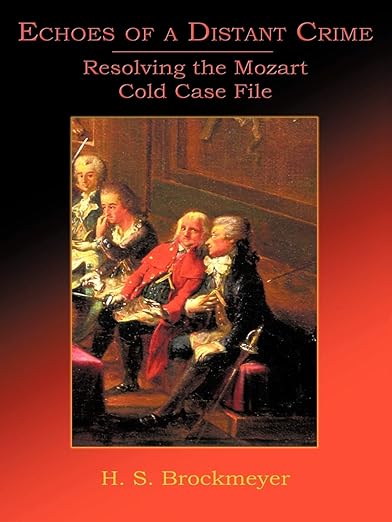Constanze Mozart in Baden bei Wien
🌿 A Spa Town, a Farewell, a Mystery
By H. S. Brockmeyer
The deep, resonant tones of the Pummerin bell in St. Stephen’s Cathedral may have inspired Mozart’s compositions for bass voices, particularly Sarastro in The Magic Flute. As he lived near the cathedral in his final year, the profound sound of the bell might have shaped his musical imagination, infusing his works with a depth that echoes through time.
"You cannot imagine how I have been aching for you all this long while. I can’t describe what I have been feeling — a kind of emptiness, which hurts me dreadfully."
Abstract
In the summer of 1791, just months before Wolfgang Amadeus Mozart’s untimely death, his wife Constanze took refuge in the serene spa town of Baden bei Wien. Sent there to recover from illness and a difficult pregnancy, she became a regular at the famed thermal baths. Yet behind the healing waters and peaceful walks lay a deeper, more turbulent story: suspicions, secrets, and a final summer that would never return. In this vivid and historically rich account, H. S. Brockmeyer reconstructs Constanze’s last months with Mozart, her relationship with Franz Xaver Süssmayr, and the layered emotional world of a woman poised between love, loss, and survival.
Baden bei Wien: The Healing Retreat
Constanze Mozart first visited Baden in 1789 after a fall and illness. Prescribed 60 thermal baths by her physician, she returned there every summer through 1791. The spa town, with its Roman origins and sulphurous springs, became her sanctuary — a place to escape the oppressive heat and stress of Vienna, and later, the site of deeply personal events that would define her final summer with Mozart.
A Composer on the Road
While Constanze recovered in Baden, Mozart embarked on a concert tour with Prince Lichnowsky, hoping for financial relief. Despite noble receptions and musical success, the tour ended in disappointment. Mozart blamed Lichnowsky for debts and poor concert returns, noting bitterly: “From the point of view of applause and glory this concert was absolutely magnificent, but the profits were wretchedly meagre.”
“Find Her a Ground-Floor Room”
Mozart was attentive even from afar. In a letter to Anton Stoll, he requested an apartment for Constanze close to the baths, preferably “on the ground floor.” Her accommodation was eventually secured on Renngasse — today still known as the “Mozart Hof”. There, Mozart composed the Ave verum corpus in June 1791 and often joined his wife for brief visits, working in a garden attic room.
Letters from a Lonely Genius
Throughout the summer, Mozart’s letters to Constanze reveal emotional strain, health concerns, and deep longing. He fretted over her bathing routines, warned against slippery floors, and lamented the distance that separated them: “Even my work gives me no pleasure… because I am accustomed to stop working now and then and exchange a few words with you.”
Shadows in Paradise: The Süssmayr Affair
One shadow loomed large: Franz Xaver Süssmayr. As Mozart’s copyist and frequent companion to Constanze, his presence in Baden sparked both suspicion and jealousy. Mozart’s letters oscillate between humor and hostility: “Give Süssmayr a few sound boxes on the ear from me… it would be a good thing if you were to leave a bump on his nose.”
Later biographers — including Ludwig Hildesheimer — have questioned the nature of Constanze’s relationship with Süssmayr. Her own words, years later, suggest a complex, possibly bitter end to their connection.
A Town of Echoes and Memories
Brockmeyer describes Baden in rich detail — its leafy parks, the women’s bathhouse (now a museum), the Rosarium with 800 varieties of roses. She imagines Constanze wandering through ruins, gathering wildflowers, resting under trees, and savoring moments of calm before everything changed.
Paradise Lost
Mozart died on 5 December 1791. Süssmayr, present at his deathbed, vanished shortly after — never to return to Constanze’s life. In the aftermath, her letters show bitterness and avoidance, while he pursued his career. Whatever bond had formed in Baden, it evaporated with the winter frost.
Final Reflections
Constanze’s spa retreat was not just about health. It was about escape, identity, and perhaps the last flicker of freedom before tragedy and reinvention. In Brockmeyer’s hands, this story becomes more than biography — it becomes a portrait of a woman at the threshold of history.
You May Also Like
#3 Leopold Mozart’s Literary Theft
Hidden within the Mozarteum’s archives lies a poem that has long been hailed as a tribute to the young Mozart children. But behind this innocent façade is a story of deception, literary theft, and one father’s ambition to rewrite history.
#4 The Golden Spur
While often portrayed as a prestigious award, the Golden Spur (Speron d’Oro) granted to Mozart in 1770 was far from a reflection of his musical genius. In this article, we delve into the true story behind this now-forgotten honour, its loss of value, and the role of Leopold Mozart’s ambitions in securing it.
Mozart Unmasked: The Untold Story of His Italian Years
Explore the lesser-known side of Wolfgang Amadé Mozart’s early years in Italy. ‘Mozart in Italy’ unveils the complexities, controversies, and hidden truths behind his formative experiences, guided by meticulous research and rare historical documents. Delve into a story that challenges the traditional narrative and offers a fresh perspective on one of history’s most enigmatic composers.
Another Example of Borrowed Genius
The myth of Mozart’s genius continues to collapse under the weight of his reliance on others’ ideas, with Leopold orchestrating his son’s supposed early brilliance.
A Genius or a Patchwork?
The genius of Mozart had yet to bloom, despite the anecdotes passed down to us. These concertos were not the work of a prodigy, but a collaborative effort between father and son, built on the music of others.
Myth, Reality, and the Hand of Martini
Mozart handed over Martini’s Antiphon, not his own, avoiding what could have been an embarrassing failure. The young prodigy had a lot to learn, and much of what followed was myth-making at its finest.







